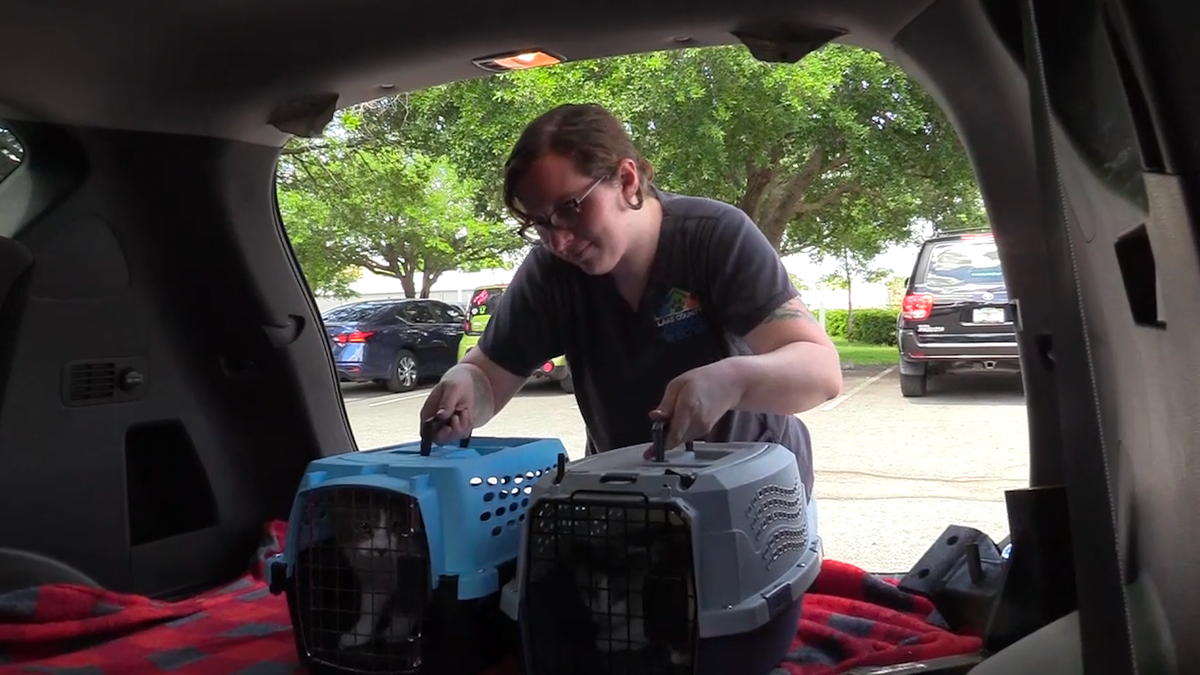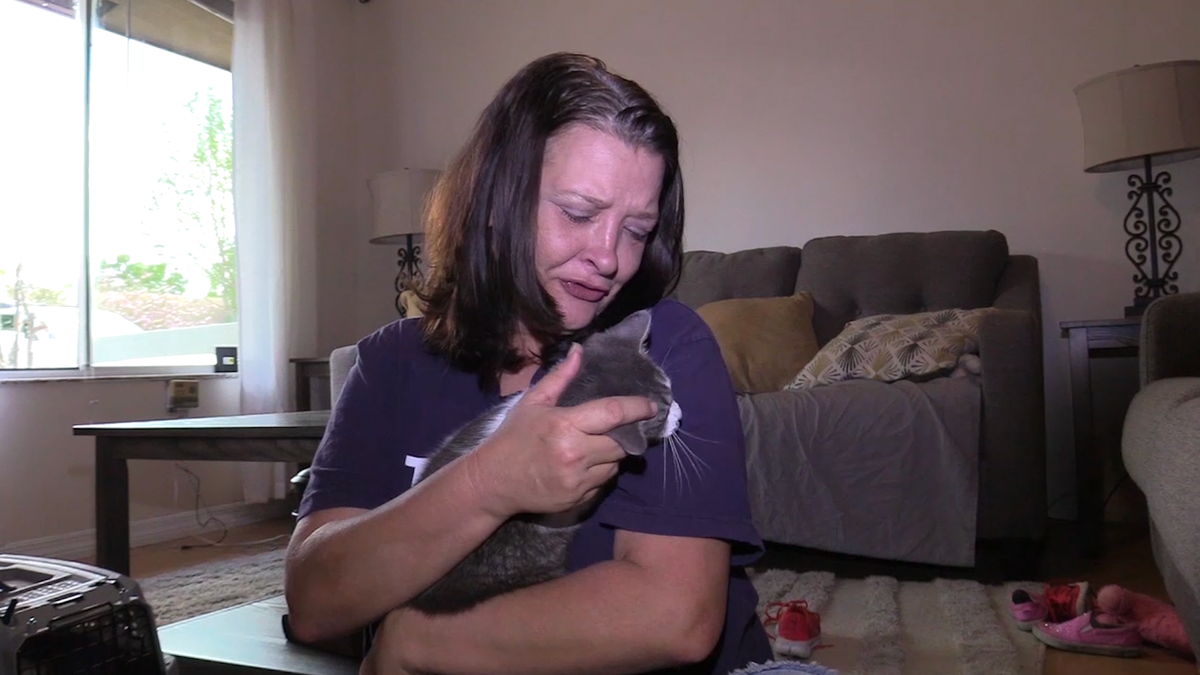Animal shelters using innovative strategies amid COVID-19 concerns
For fear of a surge in homeless animals due to coronavirus, shelters are thinking outside the box to place pets in new homes.
Get all the latest news on coronavirus and more delivered daily to your inbox. Sign up here.
TAVARES, Fla. – Ellie the cat and her feline friend Willa recently arrived at the Lake County Animal Shelter in Tavares, Fla. It was a long road — but you would never know it judging by their personalities.
"Both are very affectionate girls," Whitney Boylston, director of the Lake County Animal Shelter, told Fox News. "They both love attention and snuggle times."

Ellie (left) and Willa recently arrived at Lake County Animal Shelter in Tavares, Fla. (Jessica Albert, Fox 35 Orlando)
CLICK HERE FOR FULL CORONAVIRUS COVERAGE
Ellie was a stray, and Willa's owner just passed away last week. Both ended up in the care of Boylston's team, which on any given day has hundreds of animals in their shelter.
The Humane Society of the United States told Fox News that pet homelessness is always a concern, claiming that nationwide 6.5 million pets will go through shelters annually.
DOG, EXCITED BECAUSE OWNER IS 'HOME FOR QUARANTINE,' SPRAINS TAIL FROM TOO MUCH WAGGING
But as coronavirus continues to spread and shut down large parts of the country, animal experts fear that the nation will see an uptick in surrendered animals. If left unaddressed, shelters across the United States could be at risk of severe overcrowding.
“This is an issue all the time, but it becomes more acute during COVID-19,” said Kitty Block, the CEO and president of the Humane Society of the United States. “If people financially are running into difficulties caring for their animal, they’ll get surrendered to shelters. Or, if there are family members that become ill and can’t take care of their dog or cat or the pets they have in their home.”
Block added that the potential problem is amplified because the CDC is urging Americans to stay home, which makes in-person adoptions difficult or, in some cases, impossible.
So, many animal shelters are working to get ahead of the problem, and are trying new, more innovative tactics in order to find pet-loving homes for the animals in their care.
Lake County, for example, is now offering an online service to view and select pets. Prospective owners can then Facetime with the animal to see if it is a good fit, and if it is, the shelter will deliver right to the new owner's door via the aptly named "cuddle shuttle."

A Lake County Animal Shelter worker loads Ellie and Willa into the "cuddle shuttle" to be delivered to their new owner (Jessica Albert, Fox 35 Orlando)
These new approaches have made an impact, with dozens of animals finding new homes this month, including Ellie and Willa. Both went to a Lake County woman named Tawnya McDonie, who initially only planned to take one cat. But, after she heard the shelter's call for help, she opted to take two.
"I'm a sucker!" exclaimed McDonie. "I would take every one if I could. But, in this time when people are dumping their animals, I decided to give two a home."

Tawnya McDonie holding her new cat, Ellie, for the first time (Jessica Albert, Fox 35 Orlando).
For the time being, Lake County Animal Shelter is operating in a much better position.
"Our shelter census is actually lower today than it's been in a very long time," said Boylston.
Out in Arizona, Maricopa County Animal Care and Control is using similar innovative services, while also flooding social media with calls for foster homes and adoptions. As a result, over 400 animals have been placed and many of their kennels are now empty.
"I have never seen a community come together like this for the animals," Mary Martin, the organization's director told Fox News. "Hundreds of animals have gotten out of the shelter in the last week or so, to the point I have seen open buildings and open wings with just a few animals in them. It’s the first time we’ve ever seen this."
Martin cautioned, however, that her team still has plenty of work to do because they are restricted as to what animals they can take in. Due to coronavirus, she said they are unable to take cats or surrendered dogs, and can only accept stray dogs, which coincides with the Arizona state mandate.
"We're off to a wonderful start, but we're not out of the woods yet," said Martin. For the time being, she encourages residents who come across a stray animal to temporarily house it themselves if safe to do so.
RELATED: Coronavirus outbreak may cause more adoptable pets to be euthanized, animal advocates say
In the short term, the rate of animals entering foster care has skyrocketed as well. A report from the organization Petpoint, which aggregates data from 1,191 animal welfare organizations, shows a 93 percent increase in animals going to foster care compared to the week prior.
Best Friends Animal Society, an animal advocacy group that also operates adoption centers around the country, has seen this trend firsthand. Their office in Atlanta typically puts 10 animals into foster care a week, but placed 62 from March 16 to March 20.
They are asking that more follow suit.
“There are so many dogs and cats who would love to spend this time with you and your family, and the need to support our local shelters has never been greater,” said Julie Castle, chief executive officer for Best Friends Animal Society, in a statement issued to Fox News.
“For many people who are working remotely from home for the first time, the isolation may be difficult to adjust to. Having a pet for company can help make you happier, more comfortable and even more productive,” she noted.
Like Martin and Block, Castle believes that there is still more to be done. Her prediction is that if COVID-19 continues to hamper the economy, the need to place animals will continue to grow. That's why her team will continue to find innovative ways to place pets and offset the demand as well.
CLICK HERE FOR THE FOX NEWS APP
"Unfortunately, we're already seeing the early signs of the economic ramifications around COVID-19, such as people losing their jobs or housing and having urgent surrender needs," said Castle. "We are projecting that this is probably the bigger, longer-term threat."

